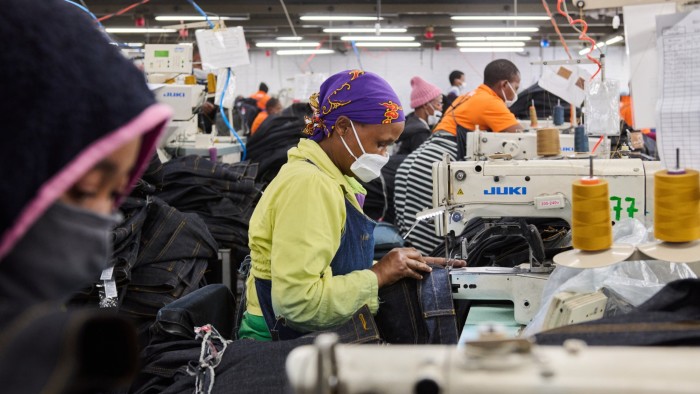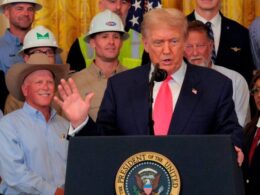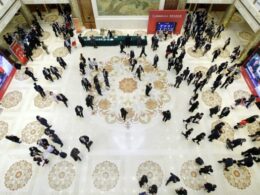Unlock the Editor’s Digest for free
Roula Khalaf, Editor of the FT, selects her favourite stories in this weekly newsletter.
Lesotho’s trade minister has warned that the country’s textiles industry, a major exporter to brands such as Levi’s and Wrangler in the US, risks having to “fold” if Donald Trump presses ahead with 50 per cent tariffs.
Mokhethi Shelile told the Financial Times that a national “state of disaster” declared this week would allow the government to fast track the creation of 60,000 jobs in other sectors over two years, as it prepares for the end to the pause on the so-called liberation day tariffs the US president announced in April.
“We are waiting anxiously for a possibility that we will be given a good, favourable rate and that favourable rate . . . can only be 10 per cent or less,” Shelile said. “Anything beyond that, we fear that our textile industry that is exporting to the United States will either have to change to other markets or simply just fold up.”
Lesotho, an unexpected success story born out of Washington’s 25-year-old African Growth and Opportunity Act (Agoa) that offers tariff-free access to the continent, was recently dismissed by Trump as “a country nobody has ever heard of”.
The mountain kingdom of 2.3mn is Africa’s largest garments exporter to the US, which in April threatened to impose a 50 per cent tariff on its exports, one of the highest rates on any country.
Lesotho’s vibrant textiles industry is the country’s largest private employer, accounting for around 40,000 jobs, but there have been mass lay-offs since the tariffs were first announced. Cuts to the US Agency for International Development have also led to hundreds of job losses.
Clothing exports make up about a tenth of Lesotho’s $2bn GDP, but the ongoing turmoil has already damaged a sector with razor-thin margins.
“There are massive lay-offs ongoing,” said Teboho Kobeli, founder of Afri Expo, one of the country’s biggest garment producers. “Unless [factories] are doing other orders beside US orders, they are totally shutting down.”
The luckier ones, he said, “are just finishing up outstanding orders that were in the pipeline. There are no new orders coming in.”
The state of disaster would allow the government to bypass standard, time-consuming bureaucratic processes and fast track plans to create thousands of jobs in construction and agriculture, Shelile said.
All ministries have been ordered to contribute 3 per cent of their budget into a $22.2mn fund that will be used for youth grants and entrepreneur loans intended to bolster the private sector, he added.
The country has a youth unemployment rate of 48 per cent.
The shifts in US policy in terms of how it handles countries like Lesotho were “adding to the wound that was already there for many years”, said Shelile.

Colette van der Ven, chief executive of Tulip Consulting, which specialises in international trade and sustainable development, said Lesotho contributes only about 0.02 per cent of the US total deficit, meaning a 50 per cent reciprocal tariff “makes zero sense”.
“The garment industry is a highly fragmented value chain, and a lot of that value isn’t actually added within Lesotho,” she added. “If the US really wants to target [its] trade deficit, this is not the country to target.”
The Trump administration has said it is working on a “template” it will use to negotiate deals with African countries.
Speaking from a fashion buyers’ event in Cape Town where Lesotho exporters were showcasing their wares, Shelile said the ongoing turmoil over tariffs had pressured the government into redoubling efforts to diversify its buyer market.
“We are making inroads into the South African market to sell some of the things that would be going to the US.”
But analysts warned that diversification efforts may not provide an easy solution, particularly within the continent.
“For the most part, other African countries are not consuming the same products as Americans are,” said Donald MacKay, chief executive of Johannesburg-based XA Global Trade Advisors. “So you’re not going to replace the US with Africa.”
Source link









